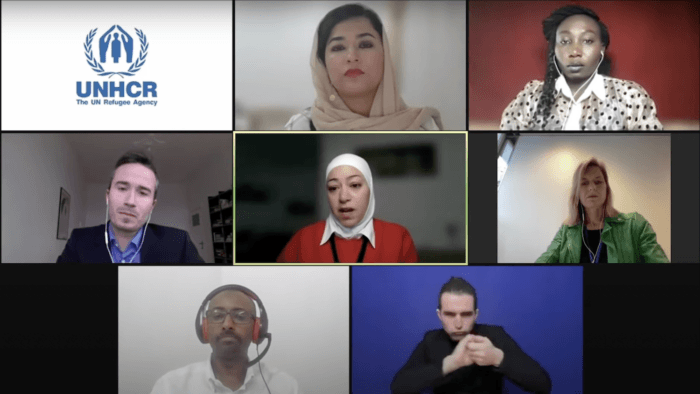In the run-up to and during the December 2021 UNHCR High-Level Officials Meeting, Global Independent Refugee Women Leaders (GIRWL) co-founders led and participated in important dialogues with officials and other stakeholders on topics including refugee participation in decision-making, age, gender and diversity, and other issues.
Anila Noor moderated three events and sessions tied to the High-Level Officials Meeting:
- Changing Policy and Practice? The Global Compact on Refugees Three Years On, with the Danish Refugee Council (DRC), International Rescue Committee (IRC) and the Norwegian Refugee Council (NRC)
- The preparatory Roundtable on Partnerships session New Forms of Collaboration with Established Partners
- Refugee Voices: Green Energy for Jobs, an event organized by the Global Platform for Action with the Global Refugee-Led Network.
Andrea Ayala spoke at the Age, Gender, and Diversity: Ending Discrimination in Refugee Responses roundtable event on 8 December.
Shaza Alrihawi and Najeeba Wazefadost joined the official Side Event on Meaningful Refugee Participation, along with Assistant High Commissioner for Protection Gillian Triggs, UNHCR High Profile Supporter Abbas Karimi and many others. Najeeba moderated the entire side event, including conversations about moving from pledge to action, cultivating new pledges, and localizing the Global Compact on Refugees.
In the opening session, Shaza delivered an impassioned call to action for achieving real refugee participation international responses and mechanisms. The following is an edited version of her remarks. You can watch the entire side event aquí.
Moving from Pledges to Actions on Meaningful Refugee Participation
Today we are no longer asking ourselves if refugee participation is possible; instead, we are exploring how we can achieve that. Unfortunately — and despite some progress made —refugees continue to face significant quantitative and qualitative barriers to meaningful participation.
In 2019, refugees represented only two percent of participants at the Global Refugee Forum when the High-Level Officials Meeting was supposed to happen in person. And only 10 refugees out of 500 participants were invited again to present. And, when we are included in global forums, we are often sidelined into an advisory role rather than given formal direct participatory access. At the same time, we continue to face questions about our accountability and legitimacy.
These examples are not meant to point a finger, but rather to point out the system-wide issues including the fact that refugees are still not treated as peers in policymaking spaces.
Notwithstanding these challenges, in 2019 we have seen successful implementation of meaningful refugee participation that can be modeled and scaled. In 2019, the Global Refugee Network (GRN) launched the refugee participation pledge, the first pledge made at the Global Refugee Forum. This pledge called for the support of the meaningful participation of refugees in decisions that affect their lives. It has been signed by over 17 actors including Canada, Denmark, Australia and the Netherlands. We look forward to seeing more actors signing the pledge.
Drafted using the principles of the Grand Bargain’s Participation Revolution, the Age, Gender and Diversity framework, and the Sustainable Development Goals agenda to leave no one behind, the pledge has led to the formation of an ad hoc, multi-stakeholder coalition that works together to advocate the meaningful refugee participation agenda. GRN has also led the initiative to increase direct refugee engagement in the Annual Tripartite Consultations on Resettlement.
Through GRN’s network of refugees in six regions around the world, we have seen meaningful engagement in policy access happening. We regularly map and connect our work and we are coordinating refugees advocacy regionally and globally. So far, meaningful refugee participation is done well. It has produced innovative and effective outcomes. While COVID-19 made the global response for the refugee crisis more urgent, it also demonstrates the importance of our role in the response. With traditional humanitarian actors facing new travel restrictions and capacity limitations, refugee-led organizations filled the gap and provided life-saving assistance to both refugees and host communities.
GRN is recommending three concrete ways that international community can make the Global Compact on Refugees’ call for meaningful refugee participation a reality:
- We invite you to join our refugee participation pledge and help us advocate to change the system for more inclusion of affected communities.
- We urge you to increase direct access to flexible funding for refugee-led organizations, particularly to help women and girls, youths, the disabled, and LGBTQ and other often excluded refugee groups.
- We implore you to advocate for secure, equal and quality healthcare for forcibly displaced people, including access to COVID-19 vaccine.
Today, GRN launched a report, Power & The Margins: The State of Refugee Participation. The important lesson that we can share from our journey toward meaningful refugee participation is that our community is extremely powerful.
Read More
Refugee Voices Matter – Nothing about Us, Without Us, Global Issues, Written by Anila Noor, Eliasib Amet Herrera, and Shaza Alrihawi (Displaced)

